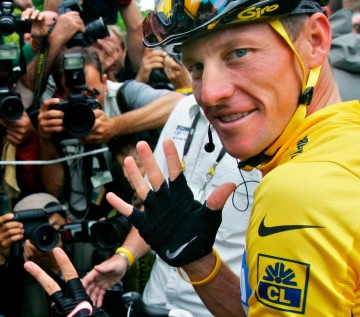 Once upon a time, a young man from Texas beat cancer and went on to win the prestigious Tour de France cycling race seven times. He was lauded a hero. Then, last week, the fairy tale came to an end.
Once upon a time, a young man from Texas beat cancer and went on to win the prestigious Tour de France cycling race seven times. He was lauded a hero. Then, last week, the fairy tale came to an end.
After nearly a decade of vehemently defending himself against accusations that he took performance-enhancing drugs to win, Lance Armstrong came clean. He admitted to Oprah Winfrey that yes, he took a variety of illegal substances during his racing years, and even bullied his friends and teammates into keeping quiet. Armstrong blamed a “ruthless” desire to win “at all costs,” especially after his fight against testicular cancer. Read more about the interview and Lance’s confession here.
Those of us who believed in the Lance Armstrong fairy tale now feel disappointed and betrayed. Yet his fall from grace offers us an opportunity to consider our own beliefs about winning, cheating, lying and forgiveness. Below, we offer questions for teenagers and younger kids.
Questions for Teens
1. Lance Armstrong told Oprah that he “viewed it as a level playing field where most everybody doped.” Have you ever done something you knew wasn’t right because everybody else was doing it, or because you really wanted to win? Does that make it okay to cheat?
2. The Armstrong story isn’t only about lying and cheating, but about bullying people – his friends and former teammates. Which is his worst offense: bullying, cheating or lying about cheating? Why?
3. As a cancer survivor, Armstrong created the Livestrong Foundation, an organization committed to empowering and educating cancer patients. In this Globe Magazine opinion piece, a doctor from the Dana Farber Cancer Institute argues that Armstrong remains a hero because he raised a lot of money to fight cancer and help people. What do you think? Should his efforts to fight cancer overshadow his other actions?
4. Another recent Boston Globe article examines lying and deception. The article bring ups an interesting problem called “magician’s guilt,” in which magicians feel guilty because they are deceiving people for the purpose of entertainment. Is it okay to lie in order to entertain people? If so, where do you draw the line?
5. Lance said that he would like to run in the Chicago Marathon when he turns 50, yet he is banned from all U.S. government sanctioned events, including cycling and marathons. Now that he has confessed, do you think Lance should be forgiven and allowed to compete again?
Questions for Younger Kids
1. Lance Armstrong said that he cheated because everyone else was doing it. What would you do if you knew other people were doing something that wasn’t right?
2. Lance’s story isn’t only about cheating, but about bullying people – his friends and former teammates. What do you think is worse, cheating or bullying? Why?
3. For a long time, Lance was viewed as a superhero. Do you think real people can be superheroes? Who do you know that you think is a superhero in real life? Why?
4. If you met Lance, what would you want to say to him or ask him?
5. For a long time, Lance lied about his cheating because he thought he wouldn’t get caught. What do you think he should have done instead?
Image via.
